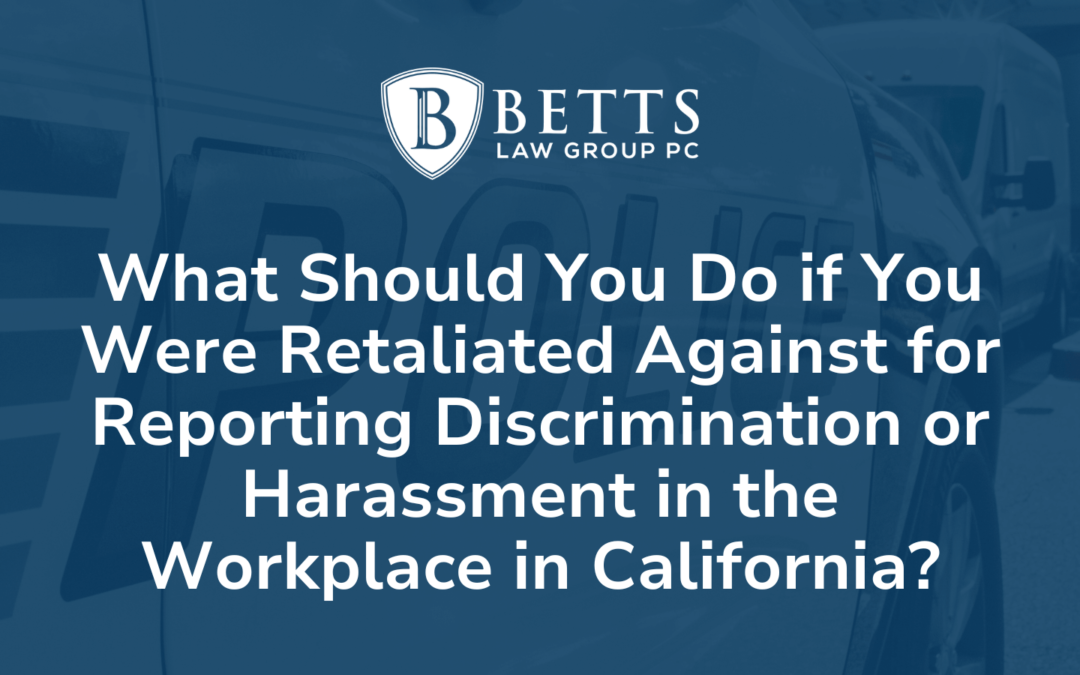If you have experienced retaliation after reporting workplace discrimination or harassment in the workplace, or asserting any of your legally protected employee rights, you know it can be an overwhelming experience. Retaliation after reporting wrongdoing can leave employees feeling isolated and unsure of their next steps. If you reported what you believed to be a violation of the law, and your employer takes action against you, you have rights.
Our team of California employment law attorneys at Betts Law Group understand the courage it takes to report discrimination or harassment in the workplace. With years of experience in employment law in California, our team is here to guide you through this challenging situation, ensuring you know your options and the resources available to you if you are experiencing retaliation.
What Constitutes Retaliation in California?
Retaliation occurs when an employer takes negative action against an employee for reporting discrimination or harassment. Retaliation can also occur anytime you assert a legally protected right: such as taking medical or family leave, using sick time, or even going to your child’s school for school activities (depending on employer size) or for a school suspension (regardless of employer size). Types of workplace retaliation can include:
- Termination
- Demotion
- Reduction in hours or pay
- Change in schedules or assignments
- Negative performance reviews
- Harassment or creating a hostile work environment
Being wrongfully terminated for reporting sexual harassment in the workplace is a serious offense and employers could face legal consequences. Understanding what qualifies as retaliation is crucial, as it shapes the steps you should take to protect yourself and your rights.
Why Do Employers Retaliate in California?
Employers may retaliate for several reasons. Their motivations are often based on a desire to maintain control and a fear of negative consequences. Some of the actions that could trigger retaliation with an employer are:
- Reporting misconduct
- Exercising legal rights
- Lodging complaints
- Requesting investigation
Common reasons why employers may retaliate include:
- Attempting to protect their reputation
- Trying to deter others from speaking out
- Misplaced anger at the employee for “causing trouble”
By recognizing why retaliation in the workplace occurs, you can better advocate for your rights and take the right steps to address the issue. Empowering yourself with knowledge allows you to stand firmly against unjust actions and seek the support necessary to maintain a respectful and fair workplace environment. A lawyer with experience in employment law can help guide you through the process and make sure you have the information you need to move forward.
What To Do After Experiencing Retaliation in the Workplace
The first step to take when experiencing retaliation in the workplace is to make sure everything is properly documented. Documenting workplace retaliation is crucial for several reasons.
First, it creates a detailed record of events which can strengthen your case if you decide to take legal action. Clear documentation, including dates, times, names of witnesses and specific incidents, helps establish a timeline and pattern of behavior.
Additionally, having thorough notes can be helpful in discussions with HR or legal representatives, ensuring that you present a compelling argument.
Some additional steps you should take if you are facing retaliation:
- Check your employee handbook or company policies regarding harassment and retaliation. Most organizations have specific procedures for reporting these issues, which can provide a clear framework for what to do next.
- If you feel comfortable, talk to a trusted coworker about your situation. They may have witnessed the retaliation or could provide support. Additionally, their perspective can help you gauge whether your experience is part of a larger pattern within the workplace.
- You may want to report the retaliation to your employer, usually through HR. When doing so, remember to present your documentation clearly, stay professional, and outline the specific instances of retaliation.
- HR often only wants to have these conversations in person, and it is up to you to ensure a written record is made of what was discussed in the meeting where you report. A helpful tip is to write HR an email after the meeting confirming what you reported in the meeting, what you requested, and what HR promised they would do in response.
Why You Should Hire An Attorney if You’ve Been Retaliated Against in the Workplace in California
Both federal and state laws protect employees from retaliation. The Equal Employment Opportunity Commission (EEOC) enforces these laws, and you may also have additional protections under FEHA and other California laws. These laws can be complex, so hiring legal counsel can make an immense difference in the success of your case.
If internal reporting doesn’t yield results, you may need to file a complaint with the EEOC, California Civil Rights Department or the California Labor and Workforce Development Agency. This can be an important step in taking legal action against your employer. Filing a complaint may seem intimidating, but an attorney can guide you through the process, helping to ensure that all necessary paperwork is completed accurately, preserves and asserts all rights, and submitted on time.
An attorney experienced in employment law can help you:
- Navigate the complex legal processes
- Understand your rights
- Developing a strong case based on your documentation and evidence
Contact Betts Law Group Today for A Consultation!
At Betts Law Group, we believe that no employee should face these challenges alone.
If you find yourself facing retaliation, contact us as soon as possible. Our team is dedicated to helping you navigate this difficult journey, advocating for your rights and well-being every step of the way. You deserve a safe and respectful workplace, and we’re here to help you reclaim it.





